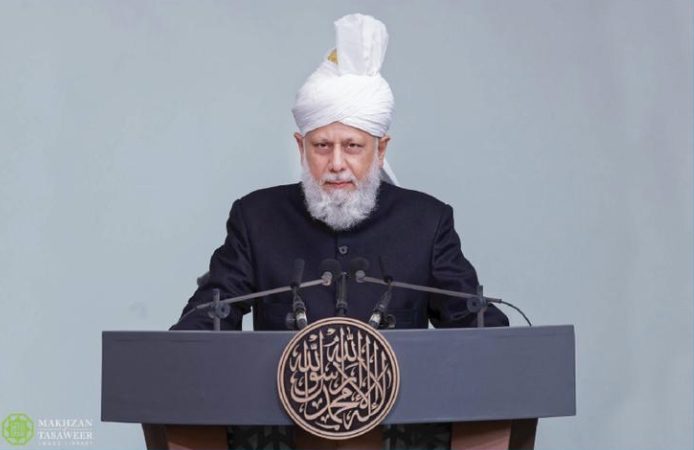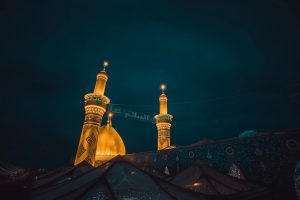After reciting Tashahhud, Ta‘awwuz and Surah al-Fatihah, His Holiness, Hazrat Mirza Masroor Ahmad (aba) said that he would continue mentioning the Expedition of Banu Mustaliq.

His Holiness (aba) said that whilst returning from Banu Mustaliq as the Holy Prophet (sa) passed through a place called Nuqi which had a lot of greenery and streams, the Holy Prophet (sa) asked about its water and he was told that in the warmer times the water would become less. The Holy Prophet (sa) instructed for a well to be dug and instructed Nuqi be turned into a grazing ground. When asked how far the borders of the grazing ground should be, the Holy Prophet (sa) instructed for a caller to go atop a mountain when it was time for the morning prayer and he should make the call for prayer, and the boundaries should be set as far as the caller’s voice reaches. Furthermore, the Holy Prophet (sa) stipulated that this grazing ground would be reserved for the poor and that the wealthy should make a separate grazing ground of their own.
The Holy Prophet (sa) Organises Competitions for the Companions & His Kind Treatment Towards His Wives
His Holiness (aba) said that the Holy Prophet (sa) would come up with ways to keep the companions alert and upbeat. For example, the Holy Prophet (sa) would arrange games among the companions which comprised such competitions which would display aspects of bravery, might and moral training. This would help increase the confidence, morale and bravery of the companions. Whilst returning from the Expedition of Banu Mustaliq, the Holy Prophet (sa) arranged a race for horses and camels, in which the Holy Prophet’s (sa) camel named Qaswah was the winner in the camel race while his horse also won the horse race. It is recorded that it was on this occasion that the Holy Prophet (sa) raced Hazrat A’ishah (ra). The Holy Prophet (sa) won the race against Hazrat A’ishah (ra), and said that this made up for the time that Hazrat A’ishah (ra) had previously won in a race against him. This referred to the time when the Holy Prophet (sa) was visiting the home of Hazrat Abu Bakr (ra) and saw that Hazrat A’ishah (ra) was holding something. The Holy Prophet (sa) asked to see what it was, but Hazrat A’ishah (ra) refused and ran. The Holy Prophet (sa) ran after her but was unable to catch up to her.
His Holiness (aba) said that these were the kinds of things that the Holy Prophet (sa) did in order to keep a high morale in his household. The Holy Prophet (sa) serves as an example for us in every matter. This is also an example for those who act harshly towards their wives. His Holiness (aba) also quoted the Second Caliph (ra) who relates this incident and said that it shows that the Holy Prophet (sa) did not find anything wrong in doing activities with his wives. In previous times people would keep a distance from their wives, and some do this even to this day. Husbands would walk far ahead of their wives and there are some who might even do this today. Hence, this example of the Holy Prophet (sa) and his kind treatment serve as an example for them. This is the kind treatment towards women that the Holy Prophet (sa) exemplified.
The Great Calumny
His Holiness (aba) said that it was also during this journey that the incident of the Great Calumny (Ifk) took place. This was a false allegation levelled against Hazrat A’ishah (ra). As the Muslim caravan was returning, the Muslims had taken rest at a certain place. When it was time to leave, Hazrat A’ishah (ra) went to answer the call of nature. As she was returning to the Muslim army, she realised that her necklace was missing and so she went back to look for it. In the meantime, the companions lifted her carriage atop a camel, thinking that Hazrat A’ishah (ra) was already in it. They did not notice that she wasn’t as Hazrat A’ishah (ra) was very light. By the time Hazrat A’ishah (ra) found her necklace and returned, the Muslim caravan had already left. She thought that they would return upon realising that she wasn’t with them. As she waited, she fell asleep. Hazrat Safwan (ra) was tasked with trailing behind the army to ensure that if the caravan dropped anything, he could retrieve it. He saw Hazrat A’ishah (ra) asleep and recited, ‘Verily to Allah we belong and to Him shall we return.’ This woke Hazrat A’ishah (ra) up. The two did not say anything to each other; Hazrat Safwan (ra) had Hazrat A’ishah (ra) ride on his camel while he walked in front of it. Eventually, they reached the rest of the Muslim caravan by afternoon.
His Holiness (aba) said that upon this, Abdullah bin Ubayy bin Sulool was responsible for circulating false rumours about this incident. Upon returning to Madinah, Hazrat A’ishah (ra) fell ill for a month, and as a result, she was unaware of what people had been saying. All she noticed was that the Holy Prophet (sa) was not interacting with her as much. He would come and ask about her well-being and then depart. One day, Hazrat A’ishah (ra) went out with Umm Mistah to attend the call of nature to a designated area. It was at this time that Umm Mistah informed Hazrat A’ishah (ra) of the false rumours that were spreading about her. Hearing this news only worsened Hazrat A’ishah’s (ra) illness. After learning of this, the next time the Holy Prophet (sa) visited Hazrat A’ishah (ra), she asked his permission to visit her parents, as she intended to learn if they had heard anything. Upon going to her parent’s home, she was able to confirm that rumours were indeed being spread about her. Hazrat A’ishah (ra) cried all night.
His Holiness (aba) said that the Holy Prophet (sa) conferred with Hazrat Ali (ra) and Hazrat Usamah (ra) on the matter. Hazrat Usamah (ra) advised that he held Hazrat A’ishah (ra) in the highest regard and did not believe the rumours, thus the Holy Prophet (sa) should not send her away. Hazrat Ali (ra) was not as resolute in sharing the same opinion at the time, and suggested that the Holy Prophet (sa) find out more from the workers who would be around Hazrat A’ishah (ra). The Holy Prophet (sa) asked a worker named Barirah about the character of Hazrat A’ishah (ra). She replied that she found absolutely no fault in Hazrat A’ishah (ra) except for the fact that being young, sometimes she would leave the flour out at night and would fall very deep into sleep. In other words, she found no actual fault in Hazrat A’ishah (ra). The Holy Prophet (sa) also asked his wife Hazrat Zainab (ra) her opinion on the matter, and she said that she only had positive things to say about Hazrat A’ishah (ra).
His Holiness (aba) said that the Holy Prophet (sa) announced his disassociation from Abdullah bin Ubayy bin Sulool for the falsities that he had spread about the Holy Prophet’s (sa) family. The Holy Prophet (sa) also attested to the character of Hazrat Safwan (ra) as well, saying that he had only found good in him. In the meantime, Hazrat A’ishah (ra) said that she could not stop crying, and her parents remained with her to try and console her. It was while she was in this state that for the first time since this rumour had spread, the Holy Prophet (sa) came to her and sat by her side. He said that he had heard the rumours, and if she were innocent, then Allah would exonerate her. However, if the rumours were true, then she should seek forgiveness from Allah, for a person who accepts their mistake and then repents, then that repentance is accepted. Upon this, Hazrat A’ishah (ra) stopped crying and she asked her parents to respond; however, they did not know how they should respond. Upon this, Hazrat A’ishah (ra) herself spoke up and said that she was aware of the rumours and that people are doubting her. She said that if she said she was innocent, people would not believe her, whereas they would believe her if she accepted fault. She said that she could not find anything to say other than what Joseph (as) had said:
‘So now comely patience is good for me. And it is Allah alone Whose help is to be sought against what you assert.’ (The Holy Qur’an, 12:19)
Allah Exonerates Hazrat A’ishah (ra) From the False Allegations
His Holiness (aba) said that thereafter, while the Holy Prophet (sa) was still sitting there, he received a revelation. After receiving the revelation, the Holy Prophet (sa) smiled and said that Allah had exonerated her. There were a series of verses revealed to the Holy Prophet (sa) in this regard, which started with:
‘Verily, those who brought forth the lie.’ (The Holy Qur’an, 24:12).
His Holiness (aba) said that he would continue narrating these incidents in the future.
Appeal for Prayers
His Holiness (aba) again urged prayers for the Ahmadis in Bangladesh; may Allah swiftly improve their circumstances.
His Holiness (aba) also urged prayers for the Ahmadis in Pakistan; may Allah swiftly improve their circumstances.
His Holiness (aba) urged prayers for the oppressed in Palestine; may Allah have mercy on them. May Allah the Almighty grant sense to the leaders of the Muslim world; may they do justice to their roles as leaders, rather than becoming oppressors. It is due to their injustices that enemies become emboldened to commit injustices against Muslims, knowing that Muslims themselves are not just to themselves, so how can they call for justice from them? May Allah the Almighty have mercy upon the Muslim Ummah.
Summary prepared by The Review of Religions




Add Comment